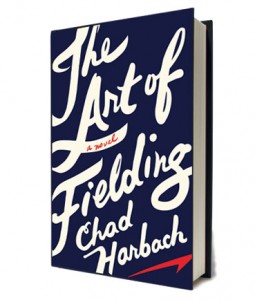Novel presents unlikely bildungsroman
Call it the Yips. It comes on quickly, without source or explanation. Steve Blass had it and was never the same. So did Chuck Knoblauch. Steve Sax caught it and somehow survived. 
What these names have in common is that they’re all baseball player names. “The Yips” is not so much a disease as the nickname given to the condition of talented athletes who are unable to do something they once did with ease — baseball players in particular.
Henry Skrimshander, of Chad Harbach’s wonderful new novel, The Art of Fielding, has an awful case of the Yips.
With the strength of his throws and the deftness of his glove, Henry makes for the perfect shortstop for the fictional Westish College, a small liberal arts school in Wisconsin, working together with Mike Schwartz, Westish’s hulking catcher and driven captain. Henry trains and refines his raw talent, which pays off midway through his third season when the Harpooners have a shot at the national title. That is, until Henry suddenly can’t make the throw to first base that he has made thousands of times before.
If this sounds like a tired story of athletic redemption, readers need not worry. In fact, The Art of Fielding is not really even a “baseball novel.” It’s a novel about growing up, specifically the kind of maturing that happens in college.
Harbach’s Westish recalls J.K. Rowling’s Hogwarts: Both are settings with personalities, places that define how their characters see the world in such an environment. Socrates’ quintessential question “How ought one to live?” becomes “How ought one to live here?” in these settings.
There is Guert Affenlight, class of ’71, a Melville scholar and Westish’s personable president who knows the first name of all 2,400 undergrads. There is Henry’s roommate and teammate Owen, a gay playwright who reads Kierkegaard in the dugout and whose status as a student-athlete is convincing only in the D-III world in which Westish plays. And there is Affenlight’s daughter, Pella, who comes to Westish to begin college at 23. A former artist and recovering manic-depressive, she is drawn to Mike, surprised at the nimble mind contained in his imposing presence.
Though college baseball touches all of their lives, it is really college to which they are committed.
These characters come alive in lucid prose that situates them without falling into cliché. For instance, the caring president fresh from the concession stand watches as a fastball nearly hits Owen and flinches in fear, “leaving fingerprints in his hotdog bun.” Owen, the brainy roommate lost in the beauty of a poem, sits with eyes closed, not asleep, “but like Sherlock Holmes at the opera, ears alert, a gentle smile on his lips.” Schwartz, the noble savage awakening next to a naked Pella, admires “the rolling coastline” of her legs.
This is exceptional writing. It provides enough detail to inform the reader of the characters’ feelings, but leaves enough out for the reader’s own experiences to magnify its meaning. Though you might never have crushed a hot dog in your hand, you know what it feels like to care for someone. You might never be a college president, but you know how it feels to be in a situation over which you have no control.
Henry, too, is consumed by and consumed with Westish, but in a different way. His immense talent and dedication shield him from hallmarks of the college experience — he rarely drinks, is befuddled by modern art and is that rare character in present-day fiction without a cell phone. For Henry, “the only life worth living was the unfree life,” the tireless repetition of practice and early-morning workouts.
This rigid asceticism sets Henry apart because it is so different from the modern conception of college — figuring out the world by having reduced expectations for a few years. Pick a major that interests you, hold off on a full-time job, explore your college town; these urgings would be at home in a brochure for USC or almost any other school. They would be almost meaningless for Henry.
And yet all the weights and wind sprints in the world can’t cure the Yips. As Henry notes, baseball players, unlike athletes in the “melee” sports of football and basketball, can’t be redeemed “through sheer desire.” They have to execute. After all, “What other sport not only kept a stat as cruel as the error, but posted it on the scoreboard for everyone to see?”
